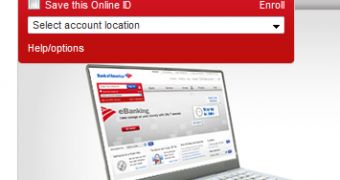The media has been buzzing with suspicions of a hacking operation that targeted the Bank of America, because of the temporary unavailability messages that were posted on the bank's official website's front page.
Most voices claimed that hackers wanted to teach the institution a lesson for introducing the debit card usage $5(€3.5) monthly fee.
As it turns out, after a few days the depository came forward with a short statement in the attempt to clear the rumors that involved cyberattacks.
According to The Register, the access problems result from the measures implemented by the bank to better manage the internet traffic during peak hours.
"The majority of our customers are able to bank online," revealed Bank of America spokeswoman Tara Burke. "There's no compromised customer information."
Suspicions were raised mostly because this wouldn't be the first time one of the largest financial institutions in the United States suffered an outage. Back in March the same issue was encountered as exactly on pay days the banks system kept failing, making many customers fear the safety of their savings.
Forbes informs us that the problems with the virtual transaction system is not the only issue Bank of America is experiencing. The company's shares on the stock market are not doing so well, reportedly dropping under $6 (€4) for the first time in BoA's existence.
As of this writing, the official website seems to be functioning properly, no warning messages being displayed, but who knows how long the situation will last. Also, there is no official press statement on the latest incidents, so we'll have to settle with “Right now, everything is fine.”
Financial institutions have been targeted a lot lately, their image being utilized in all sorts of attempts to get unsuspecting victims to hand over their account-related information. Remember to double check anything that has to do with transactions to and from your account as in some cases, the alleged emails coming from the organization can resemble a lot the genuine messages you'd normally receive.

 14 DAY TRIAL //
14 DAY TRIAL //